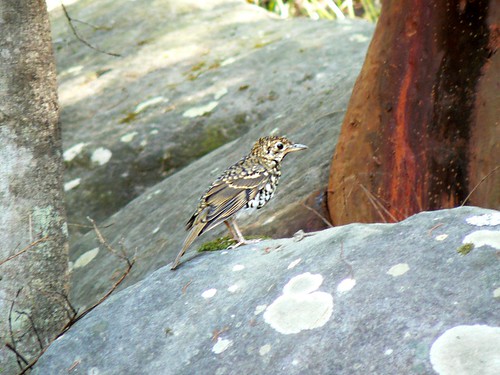First up, birds! I've linked each to the Australian Museum's Birds in Backyards website.
 |
| Zoothera lunulata Bassian Thrush |
Acanthorhynchus tenuirostris Eastern Spinebill
Accipiter fasciatus Brown Goshawk
Alectura lathami Australian Brush-turkey
Alisterus scapularis Australian King-Parrot
Anthochaera carunculata Red Wattlebird
Anthochaera chrysoptera Little Wattlebird
Aquila audax Wedge-Tailed Eagle
Aviceda subcristata Pacific Baza
Cacatua galerita Sulphur-crested Cockatoo
Cacatua roseicapilla Galah
Cacatua tenuirostris Long-billed Corella
Calyptorhynchus funereus Yellow-tailed Black-Cockatoo
Calyptorhynchus lathami Glossy Black-Cockatoo
Corvus coronoides Australian Raven
Cracticus torquatus Grey Butcherbird
Dacelo novaeguineae Laughing Kookaburra
Eopsaltria australis Eastern Yellow Robin
Eudynamys scolopacea Common Koel
Grallina cyanoleuca Magpie-lark
Gymnorhina tibicen Australian Magpie
Leucosarcia melanoleuca Wonga Pigeon
Macropygia amboinensis Brown Cuckoo-Dove
Malurus cyaneus Superb Fairy-wren
Manorina melanocephala Noisy Miner
Menura novaehollandiae Superb Lyrebird
Myiagra cyanoleuca Satin Flycatcher
Neochmia temporalis Red-browed Finch
Ninox novaeseelandiae Southern Boobook
Ninox strenua Powerful Owl
Ocyphaps lophotes Crested Pigeon
Oriolus sagittatus Olive-backed Oriole
Pachycephala rufiventris Rufous Whistler
Pardalotus striatus Striated Pardalote
Pardalotus punctatus Spotted Pardalote
Philemon citreogularis Little Friarbird
Platycercus elegans Crimson Rosella
Platycercus eximius Eastern Rosella
Podargus strigoides Tawny Frogmouth
Psophodes olivaceus Eastern Whipbird
Ptilonorhynchus violaceus Satin Bowerbird
Scythrops novaehollandiae Channel-billed Cuckoo
Sericornis frontalis White-browed Scrubwren
Sericornis citreogularis Yellow-throated Scrubwren
Strepera graculina Pied Currawong
Trichoglossus haematodus Rainbow Lorikeet
Zoothera lunulata Bassian Thrush
I see you have a Brush Turkey. So do we but we are not close to the bush. We have noticed them in the garden over the past two or three years but rarely before then. I think they were driven in searching for water towards the end of the drought and seem to have no plans to leave.
ReplyDeleteHi Ingrid! Nice to see you here. :) We have a flock (or I think battalion might be the appropriate collective noun) of brush turkeys that like to roost in a gum tree overhanging our driveway... and our car. My word they do big poops.
ReplyDeleteI've heard that one of the reasons the brush turkey populations are increasing is the baiting of foxes in National Parks and reserves. Which is great! :D
Hello Margaret-
ReplyDeleteI just found your blog as I was searching for information on native Australian plants and lorikeet nectar sources. I live in the high desert of the southwestern United States and work as an animal caretaker to 650 parrots, plus I have 14 myself. I have a small Iris Lorikeet (native to Timor) and am trying to find Eucs, Hakeas, Melaleucas, Grevilleas, etc. that are somewhat frost hardy and drought tolerant....and in particular, ones lories do like. I would be in what they call 'Zone 8' here, and most Aussie plants tend to dislike that much cold, being hardy to USDA Zone 9 or above. Any good 'gardening with birds and native plants' books you can recommend to me published in AUS? My master's degree is in environmental horticulture/public gardens, and my BS is in botany/biology...but I'm a parrot geek, living with 4 Eclectus, three African Greys, four Poicephalus, two conures and my lorikeet.
-Jean
Hi Jean,
ReplyDeleteForgive my saying so, but you sound like you have a dream job!!
A book that isn't specifically bird-oriented but which I think might suit your needs is Wrigley and Fagg, "Australian Native Plants".
http://www.publish.csiro.au/pid/5774.htm
I haven't got my copy in front of me, but from memory, each entry has a key that includes whether they're frost tolerant and if they're bird attracting. You don't need to worry too much about drought tolerance. Most of the genera you mention are pretty low on water needs once they're established. In periods of prolonged drought and heat, a good long drink every now and then should keep them happy.
I see that Amazon has this book for $29.95 at the moment. Bargain!
Keep in touch... I'd love to hear how things work out!